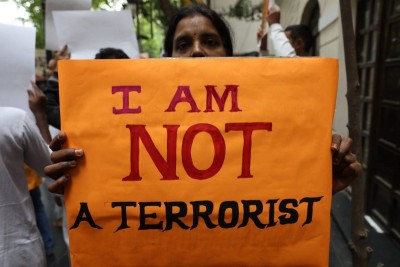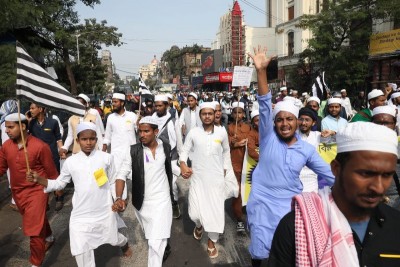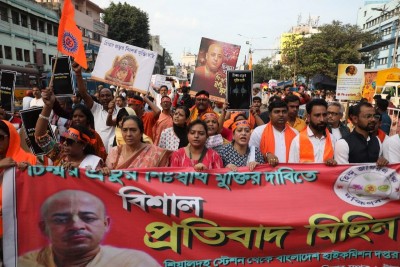
New India can be realised through cooperation of all state: PM Modi at NITI Aayog
Delivering the opening remarks at the third meeting of the Governing Council of NITI Aayog, the Prime Minister said that “Team India” has once again assembled today to discuss and reflect on ways to prepare India for changing global trends.
He said the meeting today would be an opportunity to exchange views on policies and implementation.
The Prime Minister said, "It is the collective responsibility of this gathering to envision the India of 2022 – the 75th anniversary of independence – and see how we can swiftly move forward to achieve these goals."
Recalling the Father of the Nation, Mahatma Gandhi, on the occasion of the centenary of the Champaran Satyagraha, the Prime Minister said NITI Aayog has been taking steps to transform India, with fresh vigour.
He said the Government, private sector and civil society, all need to work in sync.
He noted that, "NITI was a collaborative federal body whose strength was is in its ideas, rather than in administrative or financial control."
He pointed out that the Chief Ministers did not have to come to NITI for approval of budgets or plans.
Modi said NITI Aayog had gone beyond relying on government inputs and taken on board a number of outside specialists, subject experts, and Young Professionals; and States can also contribute to policy formulation. He gave the example of e-NAM, where experiences of States played a key role in the final policy.
The Prime Minister noted that sub-groups of State Chief Ministers had given vital inputs on subjects such as Centrally Sponsored Schemes, Swachh Bharat, Skill Development and Digital payments.
Stressing the importance given to the views of Chief Ministers, he noted that it was the first time Chief Ministers had been asked to recommend the list of Centrally sponsored schemes and the sharing pattern; despite funding constraints, the recommendations were accepted immediately.
The Prime Minister mentioned that while there has been a 40 percent increase in overall fund allocation to States between 2014-15 and 2016-17, the percentage of funds tied to central schemes has declined from 40 percent of the earlier total, to 25 percent of the enhanced total with a corresponding increase in the untied share.
Modi urged States to speed up capital expenditure and infrastructure creation.
Speaking of the historic change in budget presentation date, the Prime Minister said this would enable timely availability of funds at the beginning of the financial year.
"Earlier, budgeted scheme funds were generally not approved by Parliament till May, after which they would be communicated to states and ministries. By that time, the monsoon arrived. Hence the best working season for schemes was typically lost," he said.
He also mentioned the ending of the distinction between plan and non-plan expenditure, based on the recommendation of the Rangarajan Committee in 2011, which had found the distinction to be counter-productive. Several important items of expenditure were included as ‘non-plan’ and hence neglected. Hereafter the emphasis would be on distinguishing between development and welfare expenditure on one hand, and administrative overheads on the other.
The Prime Minister said that the Goods and Services Tax shows the strength and resolve of the federal structure. He gave credit to all Chief Ministers for coming on one platform for this cause, keeping aside ideological and political differences.
Thanking the Chief Ministers, he said consensus on GST will go down in history as a great illustration of cooperative federalism. He said GST reflects the spirit of “One nation, One aspiration, One determination.”
The Prime Minister called for carrying forward the debate and discussion on simultaneous elections.
He said the NITI Aayog is working on a 15 year long term vision, 7 year medium term strategy, and 3 year action agenda. He said this effort needs support of States, and will eventually reflect in benefits to States.
Support Our Journalism
We cannot do without you.. your contribution supports unbiased journalism
IBNS is not driven by any ism- not wokeism, not racism, not skewed secularism, not hyper right-wing or left liberal ideals, nor by any hardline religious beliefs or hyper nationalism. We want to serve you good old objective news, as they are. We do not judge or preach. We let people decide for themselves. We only try to present factual and well-sourced news.







